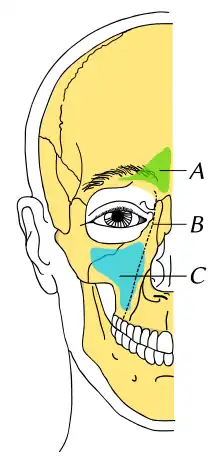Sinus implant

A Sinus implant is a medical device that is inserted into the sinus cavity. Implants can be in conjunction with sinus surgery to treat chronic sinusitis and also in sinus augmentation to increase bone structure for placement of dental implants.[1]
Types
Maxillary implant
A maxillary implant is an implant that is placed between jaw and the maxillary sinuses. It is inserted during a sinus lift or augmentation and used to increase the amount of bone to support dental implants.[1] Implants are either inserted after drilling or by using a non-drilling method known as the osteotome technique.[1] Issues such as bulging within the sinuses can occur with maxillary implants.[2][3]
Maxillary implants can also be made using Choukroun's technique with subsinus filling material.[4] The material is used to stimulate natural bone regeneration. A clinical study of this technique detailed all patients within the study had continuous stable implants six months after placement. It also showed vertical bone gain in all subjects.[4]
Rhinoplasty
Numerous different types of material have been used as sinus implants during rhinoplasty procedures. Plaster of Paris is often used during rhinoplasty and implanted into the frontal sinus.[5] Implants used in rhinoplasty have also been reported to cause enophthalmos.[6]
Sinus stent
Steroid-eluting sinus stents maybe used in addition to endoscopic sinus surgery. They are, however, of unclear benefit as of 2015.[7]
See also
References
- 1 2 3 Summers RB (February 1994). "A new concept in maxillary implant surgery: the osteotome technique". Compendium. 15 (2): 152, 154–6, 158 passim, quiz 162. PMID 8055503.
- ↑ Sbordone L, Toti P, Menchini-Fabris G, Sbordone C, Guidetti F (2009). "Implant success in sinus-lifted maxillae and native bone: a 3-year clinical and computerized tomographic follow-up". The International Journal of Oral & Maxillofacial Implants. 24 (2): 316–24. PMID 19492648.
- ↑ Tidwell JK, Blijdorp PA, Stoelinga PJ, Brouns JB, Hinderks F (August 1992). "Composite grafting of the maxillary sinus for placement of endosteal implants. A preliminary report of 48 patients". International Journal of Oral and Maxillofacial Surgery. 21 (4): 204–9. doi:10.1016/S0901-5027(05)80219-X. PMID 1328414.
- 1 2 Simonpieri A, Choukroun J, Del Corso M, Sammartino G, Dohan Ehrenfest DM (February 2011). "Simultaneous sinus-lift and implantation using microthreaded implants and leukocyte- and platelet-rich fibrin as sole grafting material: a six-year experience". Implant Dentistry. 20 (1): 2–12. doi:10.1097/ID.0b013e3181faa8af. PMID 21278521. S2CID 11294041.
- ↑ Raghavan U, Jones NS, Romo T (2004). "Immediate autogenous cartilage grafts in rhinoplasty after alloplastic implant rejection". Archives of Facial Plastic Surgery. 6 (3): 192–6. doi:10.1001/archfaci.6.3.192. PMID 15148130.
- ↑ Eloy JA, Jacobson AS, Elahi E, Shohet MR (June 2006). "Enophthalmos as a complication of rhinoplasty". The Laryngoscope. 116 (6): 1035–8. doi:10.1097/01.mlg.0000217254.22699.09. PMID 16735922. S2CID 45753208.
- ↑ Huang, Z; Hwang, P; Sun, Y; Zhou, B (10 June 2015). "Steroid-eluting sinus stents for improving symptoms in chronic rhinosinusitis patients undergoing functional endoscopic sinus surgery". The Cochrane Database of Systematic Reviews (6): CD010436. doi:10.1002/14651858.CD010436.pub2. PMID 26068957.